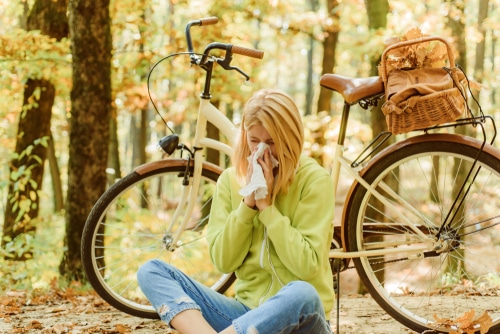
Fall is everyone’s favorite time of year. Colorful foliage, crisp temperatures, and lively festivals would make anyone want to spend most of their time outdoors. But, with all the great things that come with fall, seasonal allergies can make some people miserable. The symptoms of seasonal allergies can be enough to keep some people confined indoors.
However, understanding how to avoid your allergens and address allergy symptoms can help you get back to enjoying all that fall has to offer.
Ragweed
Beginning in August, ragweed can wreak havoc on our allergies, leading to many uncomfortable symptoms. Ragweed is a common plant with a rough stem, small heads, spikes, and divided leaves and flowers. These plants are a nuisance because their pollen can quickly spread through the breeze, making many people suffer as a result.
Mold
Mold is a common allergen that can have wide-ranging effects. While it is usually prevalent during the warm and wet summer months, it can still pack a punch during autumn. As temperatures drop, leaves and grass dry up and decay, causing mold spore production to increase. Also, rapidly changing weather in the midwest can cause mold spores to ramp up due to the weather going from warm and dry to cool and damp in hours.
Activities That Aggravate Allergies
If you suffer from allergies, it’s crucial to limit activities that can worsen allergies. While you may be tempted to stay out in the yard and rake up leaves, you could be setting yourself up for a significant allergy attack. Raking can stir up pollen spores and make them airborne, causing problems for miles. If you have allergies, experts recommend wearing a mask while doing yard work to avoid inhaling allergens.
Other Fall activities you may want to limit are:
- Hayrides
- Corn mazes
- Weed pulling
- Early morning outdoor activities
What You Can Do For Relief
We all want to enjoy all that fall has to offer. While allergins can make it challenging to enjoy the season, you have several options that may help. First, it’s essential to remain consistent with the over-the-counter allergy medication that you may need.
Also, limiting your exposure to allergens as much as possible can help. Closing doors and windows, showering, and changing clothes after returning from outdoors can help keep allergens in check.
But, in some cases, professional treatment may be what you need to finally get relief from your allergies. The Saint Louis Sinus Center offers many treatments designed to fight the effects of allergies, helping you get back to enjoying the outdoors.
To learn more about how we can help schedule a consultation with one of our two locations by calling us at 314-582-0888.

